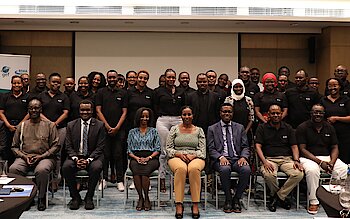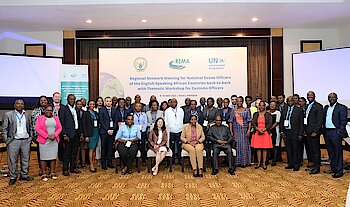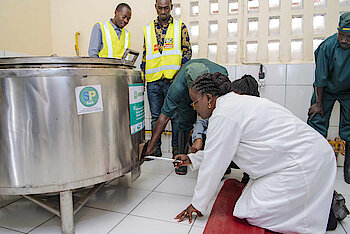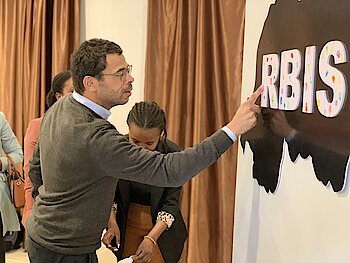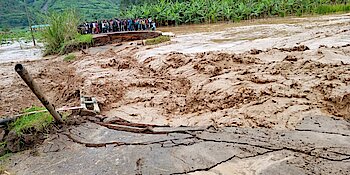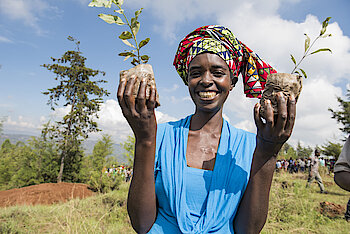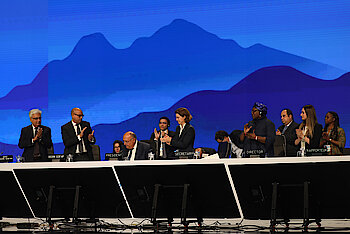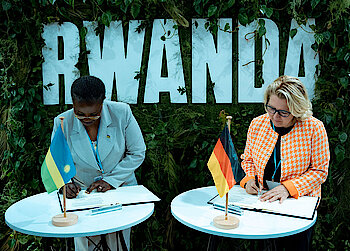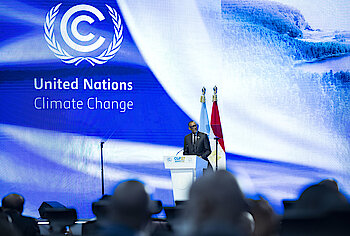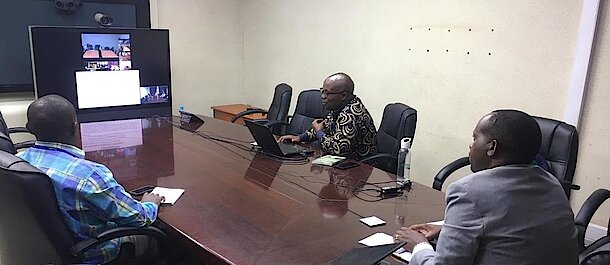
Assessment of Rwanda’s vulnerability to climate change was presented to local authorities
Rwanda Environment Management Authority (REMA), with the logistical support of Ministry of Local Government (MINALOC), hold a video conference with Province and District representatives from all over the country on 17th March 2020 to present the findings of the latest assessment of climate change vulnerability and discuss proper measure to implement the recommendations to reduce vulnerability to climate change.
Global changes in temperature and precipitation and the regional distribution of those changes are the primary drivers affecting climate-related natural hazards such as floods, landslides and droughts that stroke Rwanda in recent years with a devastating effect on the population. From the livelihoods of rural populations to food security in urban areas, the core gateway transport, communication, energy, health, water control, and institutional systems upon which populations depended failed during some cases.
The capacity and scale of adaptation to climate change depends on the vulnerability of people and natural systems to the impacts, where vulnerability is the susceptibility shaped by exposure, sensitivity and resilience.
The report presented to local authorities provides an examination at the country’s vulnerability by taking a detailed look at climate change vulnerability in the country’s 30 districts focusing on households using various indicators of household vulnerability. This report also updates REMA’s national level vulnerability assessment, first prepared in 2015, using a broad range of indicators of vulnerability that were selected during the preparation of the first assessment.
Using indicators of exposure and sensitivity to climate change as well as adaptive capacity, this report provides a comprehensive data-driven picture of climate change vulnerability facing Rwanda. Data was collected through a survey of 2,407 households in all districts of the country; data has been analyzed and presented at the district and provincial levels.
This assessment provides an understanding of the relative vulnerability to climate change of the four provinces, the City of Kigali and 30 districts based on a vulnerability index. The climate change vulnerability index uses numbers to assess jurisdictions, which have then been categorized as Low, Medium and High vulnerability.
Local authorities were urged to the report’s recommendations in detail and make commitments to take action and renew their commitments to fight the effects of climate change. Districts were encouraged to press ahead with the implementation of the ‘green economy’ plans within their District Development Strategies (DDS). Where possible districts should review their development strategies and planned projects and ensure their plans are informed by this report’s assessment of their climate vulnerabilities, and by future climate scenario.
The report also include an assessment of vulnerability at sectoral level whereby the report reviews new data collected using the National Framework for Vulnerability Assessment established in 2015 with 37 indicators of vulnerability. It analyses the changes that have taken place since data was first gathered in 2015.
The analysis reveals that increases or improvements in adaptive capacity are helping to reduce the vulnerability of the country in the face of climate change. However these improvements have been offset to some extent by increases in the impact of climate change. Recommendations are provided aimed at targeted action to reduce the sensitivity of the country to climate change factors and to build the adaptive capacity in order to reduce vulnerability and improve the level of resilience.
Topics
More posts
REMA LAUNCHES THE EVIDENCE-BASED CLIMATE REPORTING INITIATIVE TO ADVANCE CLIMATE RESEARCH AND REPORTING
The Rwanda Environment Management Authority (REMA) in collaboration with the African Institute of Mathematical Sciences (AIMS) have on May 19, 2023…
NATIONAL OZONE OFFICERS MEET IN KIGALI TO DISCUSS THE IMPLEMENTATION OF MONTREAL PROTOCOL AND ITS KIGALI AMENDMENT
The Rwanda Environment Management Authority (REMA) in collaboration with the United Nations Environment Programme (UNEP)’s OzonAction has organized a…
REMA OFFICIALLY LAUNCHES THE LPGS DONATED TO 20 SCHOOLS IN GREEN AMAYAGA PROJECT INTERVENTION AREA
The Minister of Environment, Dr. Jeanne d’Arc Mujawamariya has on 3rd May 2023 launched the use of Liquefied Petroleum Gas (LPG) for bulk cooking in…
The Rwanda Biodiversity Information System to Drive Climate Change Adaptation and Conservation was launched
The Center of Excellence in Biodiversity and Natural Resource Management at the University of Rwanda has launched the Rwanda Biodiversity Information…
Essential things to know about the loss and damage due to climate change
The evidence of both global and local climate change impact is beyond dispute. There are clear effects of climate change occurring all across the…
Why Women’s Consideration is a Key in battling climate change impacts?
The livelihoods of billions of people throughout the world are highly impacted by climate change, despite efforts to reduce its hazards. This is…
Rwanda welcomes COP27 outcomes on climate damages fund and keeping 1.5 degree goal alive
The Government of Rwanda has welcomed the outcomes of the 27th United Nations Climate Change Conference, known as COP27. At the meeting, nations…
Rwanda launches new EUR 46M facility to finance public sector climate action
Rwanda has launched a new facility that will invest in climate action led by the public sector on the sidelines of COP27 in Sharm El-Sheik, Egypt. The…
NATIONAL STATEMENT BY PRESIDENT PAUL KAGAME AT COP27
First, I express my appreciation to President Sisi, and the Government and people of the Arab Republic of Egypt, for hosting us in beautiful Sharm El…
